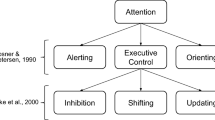Abstract
The present study aimed to determine whether exposure to an analogue traumatic event affects attentional processing of emotional information. Two groups of non-clinical participants matched on anxiety level, depression symptoms and stressful life events viewed either a trauma or a neutral film. They then performed an emotional Stroop task during which both continuous electroencephalographic activity was recorded and intrusive memories were measured. Results revealed that the valence effect (measured by the difference between emotional and neutral conditions) for the P1 amplitude was significantly greater in participants who viewed the trauma film than in participants who viewed the neutral film. This interaction was specific to words semantically related to the analogue trauma event and did not extend to all negative words. Further analyses revealed a relationship between intrusions frequency, P1 amplitude and emotional Stroop interference, indicating a link between attention and intrusive memories. Our findings suggest that exposure to potentially traumatic events has an important impact on neurocognitive function, even in the absence of psychopathology, and that this impact occurs at an early, possibly automatic stage of processing.





Similar content being viewed by others
Availability of data and material
Data and material are available from the corresponding author upon request.
Notes
An alternative explanation is that the P1 component may be more sensitive to semantic preactivation effects for emotional-related words (in the trauma group) than for neutral-related words (in the control group). However, this hypothesis could be tested by assuming that the emotional semantic priming effect in the trauma group corresponds to the amplitude difference between emotional-related and neutral-unrelated words while the (neutral) semantic priming effect in the control group corresponds to the amplitude difference between neutral-related and neutral-unrelated words. A comparison between data obtained in each group revealed no significant effect (t < 1), which seems to exclude the assumption that the partial interaction observed between valence (emotional-related, neutral-unrelated) and group (trauma, control) for the P1 amplitude resulted from an emotional semantic priming effect.
References
Algom D, Chajut E, Lev S (2004) A rational look at the emotional Stroop phenomenon: a generic slowdown, not a Stroop effect. J Exp Psychol Gen 133(3):323–338. https://doi.org/10.1037/0096-3445.133.3.323
Barrett DH, Green ML, Morris R, Giles WH, Croft JB (1996) Cognitive functioning and posttraumatic stress disorder. Am J Psychiatry 153(11):1492–1494. https://doi.org/10.1176/ajp.153.11.1492
Beck AT, Steer RA, Brown G (1996) Manual for the Beck Depression Inventory-II. Psychological Corporation, San Antonio
Block SR, Liberzon I (2016) Attentional processes in posttraumatic stress disorder and the associated changes in neural functioning. Exp Neurol 284:153–167. https://doi.org/10.1016/j.expneurol.2016.05.009
Bonett DG, Wright TA (2000) Sample size requirements for estimating Pearson, Kendall and Sprearman correlations. Psychometrika 65(1):23–28. https://doi.org/10.1007/BF02294183
Bourassa ME, Vachon F, Brisson B (2015) Failure of temporal selectivity: electrophysiological evidence for (mis)selection of distractors during the attentional blink. Psychophysiology 52(7):933–941. https://doi.org/10.1111/psyp.12426
Brewin CR, Saunders J (2001) The effect of dissociation at encoding on intrusive memories for a stressful film. Br J Clin Psychol 74:467–472. https://doi.org/10.1348/000711201161118
Brewin CR, Christodoulides J, Hutchinson G (1996) Intrusive thoughts and intrusive memories in a nonclinical sample. Cogn Emot 10(1):107–112. https://doi.org/10.1080/026999396380411
Brisson B (2015) Task switching mediates direct interference of intertarget distractors in the attentional blink: an event-related potential study. Psychophysiology 52(7):919–932. https://doi.org/10.1111/psyp.12416
Caparos S, Blanchette I (2014) Emotional Stroop interference in trauma-exposed individuals: a contrast between two accounts. Conscious Cogn 28:104–112. https://doi.org/10.1016/j.concog.2014.06.009
Cassiday KL, McNally RJ, Zeitlin SB (1992) Cognitive processing of trauma cues in rape victims with posttraumatic-stress disorder. Cogn Ther Res 16(3):283–295. https://doi.org/10.1007/bf01183282
Cisler JM, Wolitzky-Taylor KB, Adams TG, Babson KA, Badour CL, Willems JL (2011) The emotional Stroop task and posttraumatic stress disorder: a meta-analysis. Clin Psychol Rev 31(5):817–828. https://doi.org/10.1016/j.cpr.2011.03.007
Cochrane R, Robertson A (1973) The life events inventory: a measure of the relative severity of psycho-social stressors. J Psychosom Res 17(2):135–139. https://doi.org/10.1016/0022-3999(73)90014-7
Craig AR, Fisher WW (2019) Randomization tests as alternative analysis methods for behavior-analytic data. J Exp Anal Behav 111(2):309–328. https://doi.org/10.1002/jeab.500
David FN (1938) Tables of the ordinates and probability integral of the distribution of the correlation coefficient in small samples. University Press, Cambridge
Ehlers A, Clark DM (2000) A cognitive model of posttraumatic stress disorder. Behav Res Ther 38(4):319–345. https://doi.org/10.1016/s0005-7967(99)00123-0
Ehlers A, Hackmann A, Michael T (2004) Intrusive re-experiencing in post-traumatic stress disorder: phenomenology, theory, and therapy. Memory 12(4):403–415. https://doi.org/10.1080/09658210444000025
Fani N, Jovanovic T, Ely TD, Bradley B, Gutman D, Tone EB, Ressler KJ (2012a) Neural correlates of attention bias to threat in post-traumatic stress disorder. Biol Psychol 90(2):134–142. https://doi.org/10.1016/j.biopsycho.2012.03.001
Fani N, Tone EB, Phifer J, Norrholm SD, Bradley B, Ressler KJ, Kamkwalala A, Jovanovic T (2012b) Attention bias toward threat is associated with exaggerated fear expression and impaired extinction in PTSD. Psychol Med 42(3):533–543. https://doi.org/10.1017/s0033291711001565
Gauthier J, Bouchard S (1993) A French-Canadian adaptation of the revised version of Spielberger’s State-Trait Anxiety Inventory. Can J Behav Sci 25(4):559–578. https://doi.org/10.1037/h0078881
Gilbertson MW, Paulus LA, Williston SK, Gurvits TV, Lasko NB, Pitman RK, Orr SP (2006) Neurocognitive function in monozygotic twins discordant for combat exposure: relationship to posttraumatic stress disorder. J Abnorm Psychol 115(3):484–495. https://doi.org/10.1037/0021-843x.115.3.484
Gilet AL, Gruhn D, Studer J, Labouvie-Vief G (2012) Valence, arousal, and imagery ratings for 835 French attributes by young, middle-aged, and older adults: the French Emotional Evaluation List (FEEL). Eur Rev Appl Psychol 62(3):173–181. https://doi.org/10.1016/j.erap.2012.03.003
Grégoire L, Caparos S, Leblanc CA, Brisson B, Blanchette I (2018) Sexual abuse exposure alters early processing of emotional words: evidence from event-related potentials. Front Hum Neurosci 11:1–15. https://doi.org/10.3389/fnhum.2017.00655
Grégoire L, Gosselin I, Blanchette I (2020) The impact of trauma exposure on explicit and implicit memory. Anxiety Stress Coping 33(1):1–18. https://doi.org/10.1080/10615806.2019.1664477
Gvozdanovic GA, Stämpfli P, Seifritz E, Rasch B (2017) Neural correlates of experimental trauma memory retrieval. Hum Brain Mapp 38(7):3592–3602. https://doi.org/10.1002/hbm.23613
Hagenaars MA, Brewin CR, van Minnen A, Holmes EA, Hoogduin KAL (2010) Intrusive images and intrusive thoughts as different phenomena: two experimental studies. Memory 18(1):76–84. https://doi.org/10.1080/09658210903476522
Hamann S (2001) Cognitive and neural mechanisms of emotional memory. Trends Cogn Sci 5(9):394–400. https://doi.org/10.1016/S1364-6613(00)01707-1
Herbert C, Junghofer M, Kissler J (2008) Event related potentials to emotional adjectives during reading. Psychophysiology 45(3):487–498. https://doi.org/10.1111/j.1469-8986.2007.00638.x
Holle C, Neely JH, Heimberg RG (1997) The effects of blocked versus random presentation and semantic relatedness of stimulus words on response to a modified Stroop task among social phobics. Cogn Ther Res 21(6):681–697. https://doi.org/10.1023/a:1021860324879
Holmes EA, Bourne C (2008) Inducing and modulating intrusive emotional memories: a review of the trauma film paradigm. Acta Psychol 127(3):553–566. https://doi.org/10.1016/j.actpsy.2007.11.002
Holmes EA, Brewin CR, Hennessy RG (2004) Trauma films, information processing, and intrusive memory development. J Exp Psychol Gen 133(1):3–22. https://doi.org/10.1037/0096-3445.133.1.3
Holmes EA, James EL, Kilford EJ, Deeprose C (2010) Key steps in developing a cognitive vaccine against traumatic flashbacks: visuospatial tetris versus verbal pub quiz. PLoS One 5(11):1–9. https://doi.org/10.1371/journal.pone.0013706
James EL, Lau-Zhu A, Clark IA, Visser RM, Hagenaars MA, Holmes EA (2016) The trauma film paradigm as an experimental psychopathology model of psychological trauma: intrusive memories and beyond. Clin Psychol Rev 47:106–142. https://doi.org/10.1016/j.cpr.2016.04.010
Kaspi SP, McNally RJ, Amir N (1995) Cognitive processing of emotional information in posttraumatic stress disorder. Cogn Ther Res 19(4):433–444. https://doi.org/10.1007/bf02230410
Kilpatrick DG, Resnick HS, Milanak ME, Miller MW, Keyes KM, Friedman MJ (2013) National estimates of exposure to traumatic events and PTSD prevalence using DSM-IV and DSM-5 criteria. J Trauma Stress 26(5):537–547. https://doi.org/10.1002/jts.21848
Koenen KC, Ratanatharathorn A, Ng L, McLaughlin KA, Bromet EJ, Stein DJ, Karam EG, MeronRuscio A, Benjet C, Scott K, Atwoli L, Petukhova M, Lim CCW, Aguilar-Gaxiola S, Al-Hamzawi A, Alonso J, Bunting B, Ciutan M, de Girolamo G, Degenhardt L, Gureje O, Haro JM, Huang Y, Kawakami N, Lee S, Navarro-Mateu F, Pennell BE, Piazza M, Sampson N, ten Have M, Torres Y, Viana MC, Williams D, Xavier M, Kessler RC (2017) Posttraumatic stress disorder in the World Mental Health Surveys. Psychol Med 47(13):2260–2274. https://doi.org/10.1017/s0033291717000708
LaBar KS, Cabeza R (2006) Cognitive neuroscience of emotional memory. Nat Rev Neurosci 7(1):54–64. https://doi.org/10.1038/nrn1825
Lakens D (2013) Calculating and reporting effect sizes to facilitate cumulative science: a practical primer for t-tests and ANOVAs. Front Psychol 4:1–12. https://doi.org/10.3389/fpsyg.2013.00863
Li W, Zinbarg RE, Paller KA (2007) Trait anxiety modulates supraliminal and subliminal threat: brain potential evidence for early and late processing influences. Cogn Affect Behav Neurosci 7(1):25–36. https://doi.org/10.3758/cabn.7.1.25
Luck SJ (2005) An introduction to the event-related potential technique. The MIT Press, Cambridge
Ludbrook J (1994) Advantages of permutation (randomization) tests in clinical and experimental pharmacology and physiology. Clin Exp Pharmacol Physiol 21(9):673–686. https://doi.org/10.1111/j.1440-1681.1994.tb02570.x
Lyttle N, Dorahy MJ, Hanna D, Huntjens RJC (2010) Conceptual and perceptual priming and dissociation in chronic posttraumatic stress disorder. J Abnorm Psychol 119(4):777–790. https://doi.org/10.1037/a0020894
Mace JH (2005) Priming involuntary autobiographical memories. Memory 13(8):874–884. https://doi.org/10.1080/09658210444000485
Mangun GR, Hillyard SA (1995) Mechanisms and models of selective attention. In: Rugg MD, Coles MGJ (eds) Electrophysiology of mind: event-related brain potentials and cognition. Oxford University Press, Oxford, pp 40–85
Marshall RD, Schneier FR, Lin S, Simpson HB, Vermes D, Liebowitz M (2000) Childhood trauma and dissociative symptoms in panic disorder. Am J Psychiatry 157(3):451–453. https://doi.org/10.1176/appi.ajp.157.3.451
McNally RJ, Kaspi SP, Riemann BC, Zeitlin SB (1990) Selective processing of threat cues in posttraumatic stress disorder. J Abnorm Psychol 99(4):398–402. https://doi.org/10.1037/0021-843x.99.4.398
Metzger LJ, Orr SP, Lasko NB, McNally RJ, Pitman RK (1997) Seeking the source of emotional stroop interference effects in PTSD: A study of P3s to traumatic words. Integr Physiol Behav Sci 32(1):43–51. https://doi.org/10.1007/bf02688612
Näätänen R, Simpson M, Loveless NE (1982) Stimulus deviance and evoked-potentials. Biol Psychol 14(1–2):53–98. https://doi.org/10.1016/0301-0511(82)90017-5
New B (2006) "Lexique 3: Une nouvelle base de données lexicales", in Actes de la Conférence Traitement Automatique des Langues Naturelles (TALN 2006), avril 2006, Louvain, Belgique
Nixon RDV, Cain N, Nehmy T, Seymour M (2009) Does post-event cognitive load undermine thought suppression and increase intrusive memories after exposure to an analogue stressor? Memory 17(3):245–255. https://doi.org/10.1080/09658210802592353
Polich J (2007) Updating p300: an integrative theory of P3a and P3b. Clin Neurophysiol 118(10):2128–2148. https://doi.org/10.1016/j.clinph.2007.04.019
Polich J, Kok A (1995) Cognitive and biological determinants of P300: an integrative review. Biol Psychol 41(2):103–146. https://doi.org/10.1016/0301-0511(95)05130-9
Powers A, Fani N, Murphy L, Briscione M, Bradley B, Tone EB, Norrholm SD, Jovanovic T (2019) Attention bias toward threatening faces in women with PTSD: eye tracking correlates by symptom cluster. Eur J Psychotraumatol 10:1–9. https://doi.org/10.1080/20008198.2019.1568133
Rattel JA, Grunberger LM, Reichenberger J, Liedlgruber M, Miedl SF, Blechert J, Wilhelm FH (2019) Frequency of intrusions and appraisal of related distress after analogue trauma: a comparative ecological momentary assessment methods study. Cogn Ther Res 43(1):174–184. https://doi.org/10.1007/s10608-018-9941-6
Rosenthal R (1991) Meta-analytic procedures for social research, 2nd edn. Sage, Newbury Park, CA
Sachschal J, Woodward E, Wichelmann JM, Haag K, Ehlers A (2019) Differential effects of poor recall and memory disjointedness on trauma symptoms. Clin Psychol Sci 7(5):1032–1041. https://doi.org/10.1177/2167702619847195
Sass SM, Heller W, Stewart JL, Silton RL, Edgar JC, Fisher JE, Miller GA (2010) Time course of attentional bias in anxiety: emotion and gender specificity. Psychophysiology 47(2):247–259. https://doi.org/10.1111/j.1469-8986.2009.00926.x
Schneider W, Eschman A, Zuccolotto A (2002) E-prime user’s guide. Psychology Software Tools, Pittsburgh
Schupp HT, Junghofer M, Weike AI, Hamm AO (2004) The selective processing of briefly presented affective pictures: an ERP analysis. Psychophysiology 41(3):441–449. https://doi.org/10.1111/j.1469-8986.2004.00174.x
Shalev AY, Freedman SA, Peri T, Brandes D, Sahar T, Orr SP, Pitman RK (1998) Prospective study of post-traumatic stress disorder and depression following trauma. Am J Psychiatry 155(5):630–637. https://doi.org/10.1176/ajp.155.5.630
Spielberger CD, Gorsuch RL, Lushene R, Vagg PR, Jacobs GA (1983) Manual for the state-trait anxiety inventory. Consulting Psychologists Press, Palo Alto
Tapia G, Clarys D, El-Hage W, Isingrini M (2007) Cognitive deficits in post-traumatic stress disorder: a review. Annee Psychol 107(3):489–523. https://doi.org/10.4074/S0003503307003065
Tapia G, Clarys D, Bugaiska A, El-Hage W (2012) Recollection of negative information in posttraumatic stress disorder. J Trauma Stress 25(1):120–123. https://doi.org/10.1002/jts.21659
Thomas SJ, Johnstone SJ, Gonsalvez CJ (2007) Event-related potentials during an emotional Stroop task. Int J Psychophysiol 63(3):221–231. https://doi.org/10.1016/j.ijpsycho.2006.10.002
van Hooff JC, Dietz KC, Sharma D, Bowman H (2008) Neural correlates of intrusion of emotion words in a modified Stroop task. Int J Psychophysiol 67(1):23–34. https://doi.org/10.1016/j.ijpsycho.2007.09.002
Verleger R (1988) Event-related potentials and cognition: a critique of the context updating hypothesis and an alternative interpretation of P3. Behav Brain Sci 11(3):343–356. https://doi.org/10.1017/S0140525X00058015
Wang Y-P, Gorenstein C (2013) Psychometric properties of the Beck Depression Inventory-II: a comprehensive review. Braz J Psychiatry 35(4):416–431. https://doi.org/10.1590/1516-4446-2012-1048
Weber DL (2008) Information processing bias in post-traumatic stress disorder. Open Neuroimaging J 2:29–51. https://doi.org/10.2174/1874440000802010029
Williams JMG, Mathews A, MacLeod C (1996) The emotional stroop task and psychopathology. Psychol Bull 120(1):3–24. https://doi.org/10.1037/0033-2909.120.1.3
Woodman GF (2010) A brief introduction to the use of event-related potentials (ERPs) in studies of perception and attention. Atten Percept Psychophys 72(8):2031–2046. https://doi.org/10.3758/APP.72.8.2031
Yee CM, Miller GA (1994) A dual-task analysis of ressource-allocation in dysthymia and anhedonia. J Abnorm Psychol 103(4):625–636. https://doi.org/10.1037//0021-843x.103.4.625
Zhang Y, Kong F, Han L, ul Hasan AN, Chen H (2014) Attention bias in earthquake-exposed survivors: an event-related potential study. Int J Psychophysiol 94(3):358–364. https://doi.org/10.1016/j.ijpsycho.2014.09.004
Funding
This research was supported by the Fonds de Recherche du Québec—Santé to IB.
Author information
Authors and Affiliations
Corresponding author
Ethics declarations
Conflict of interest
None of the authors have any conflict of interest to disclose.
Additional information
Communicated by Francesca Frassinetti.
Publisher's Note
Springer Nature remains neutral with regard to jurisdictional claims in published maps and institutional affiliations.
Supplementary Information
Below is the link to the electronic supplementary material.
Rights and permissions
About this article
Cite this article
Grégoire, L., Landry, L., Gustafsson, E. et al. Alteration of early attentional processing after analogue trauma exposure: evidence from event-related potentials. Exp Brain Res 239, 3671–3686 (2021). https://doi.org/10.1007/s00221-021-06234-1
Received:
Accepted:
Published:
Issue Date:
DOI: https://doi.org/10.1007/s00221-021-06234-1




